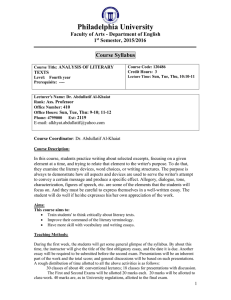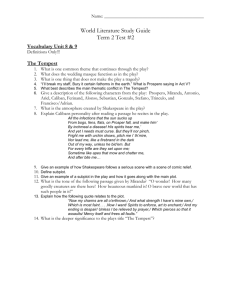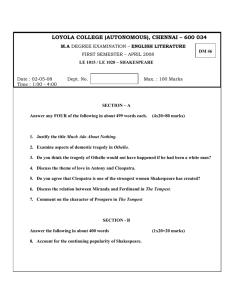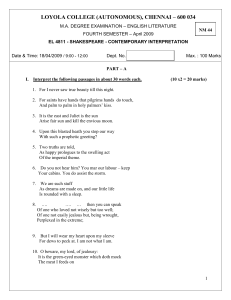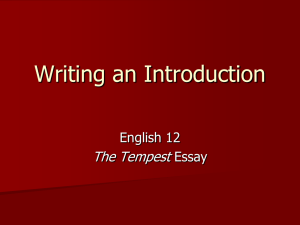Philadelphia University
advertisement
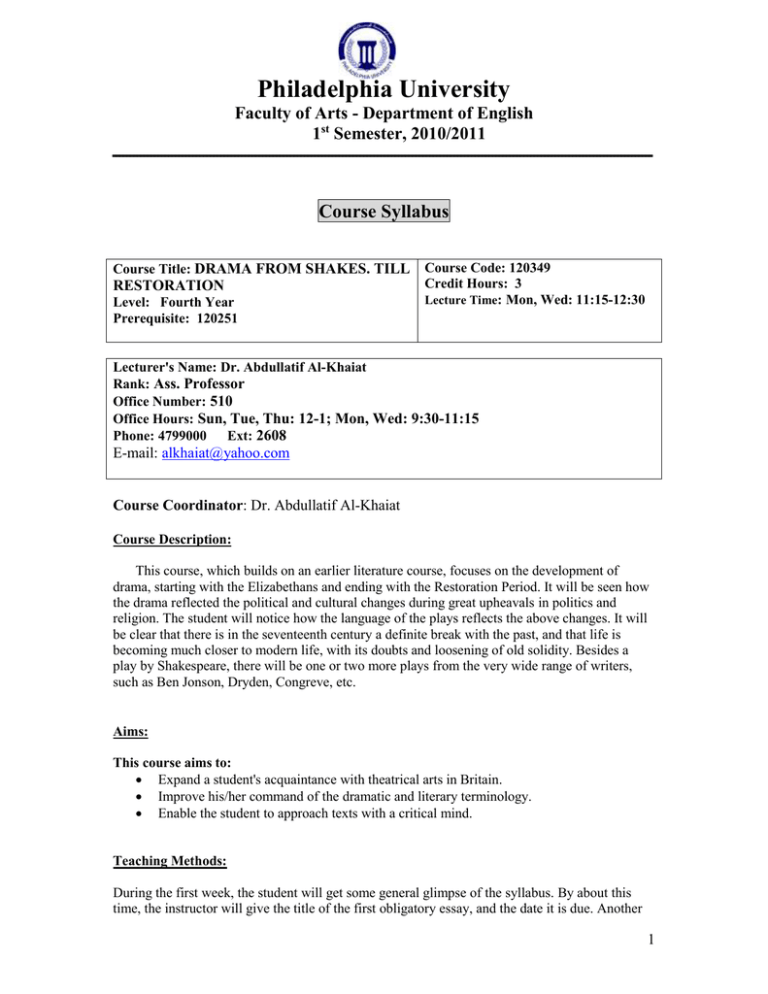
Philadelphia University Faculty of Arts - Department of English 1st Semester, 2010/2011 ـــــــــــــــــــــــــــــــــــــــــــــــــــــــــــــــــــــــــــــــــــــــــــــــــــــــــــــــــــــــــــــــــــــــــــــــــــــــــــ Course Syllabus Course Title: DRAMA FROM SHAKES. TILL RESTORATION Level: Fourth Year Prerequisite: 120251 Course Code: 120349 Credit Hours: 3 Lecture Time: Mon, Wed: 11:15-12:30 Lecturer's Name: Dr. Abdullatif Al-Khaiat Rank: Ass. Professor Office Number: 510 Office Hours: Sun, Tue, Thu: 12-1; Mon, Wed: 9:30-11:15 Phone: 4799000 Ext: 2608 E-mail: alkhaiat@yahoo.com Course Coordinator: Dr. Abdullatif Al-Khaiat Course Description: This course, which builds on an earlier literature course, focuses on the development of drama, starting with the Elizabethans and ending with the Restoration Period. It will be seen how the drama reflected the political and cultural changes during great upheavals in politics and religion. The student will notice how the language of the plays reflects the above changes. It will be clear that there is in the seventeenth century a definite break with the past, and that life is becoming much closer to modern life, with its doubts and loosening of old solidity. Besides a play by Shakespeare, there will be one or two more plays from the very wide range of writers, such as Ben Jonson, Dryden, Congreve, etc. Aims: This course aims to: Expand a student's acquaintance with theatrical arts in Britain. Improve his/her command of the dramatic and literary terminology. Enable the student to approach texts with a critical mind. Teaching Methods: During the first week, the student will get some general glimpse of the syllabus. By about this time, the instructor will give the title of the first obligatory essay, and the date it is due. Another 1 Philadelphia University Faculty of Arts - Department of English 1st Semester, 2010/2011 ـــــــــــــــــــــــــــــــــــــــــــــــــــــــــــــــــــــــــــــــــــــــــــــــــــــــــــــــــــــــــــــــــــــــــــــــــــــــــــ essay will be required to be submitted right after the second term exam. Presentations will be encouraged, and general discussions will be based on such presentations. A rough distribution of time allotted to all the above activities is as follows: 30 classes of about 48: conventional lectures; 18 classes for presentations with discussion. The First and Second Exams will be allotted 15 marks each. 20 marks will be allotted to class-work. 50 marks are, as in University regulations, allotted to the final exam. Contribution to Program Learning Outcomes: A2, A3,; B1, B2, B3, , B5; C2, C4, , C7; D1 Intended Learning Outcomes: a. Knowledge & Understanding: At the end of this course, students will be able to: Read and comprehend a play Analyze and appreciate the impact of the theatre Have a better view of literature and literatures b. Intellectual Skills (Thinking & Analysis): At the end of this course, students will be: More equipped to respond to various works of art More enabled to appreciate differences in values and cultures Of a more mature and critical mind. c. Communicative Skills (Personal and Academic) At the end of this course, students will be: Able to communicate well about literature and people. Better equipped to discuss things in a complex approach. More able to address others in good English. d. Practical and Subject Specific Skills (Transferable Skills) At the end of this course a student will be: Able to use a wide variety of approaches to negotiating interesting issues. More skilful in dealing with diverse groups, situations and topics. More capable of marketing his/ her talents in a future career requiring good English and a mature mind. 2 Philadelphia University Faculty of Arts - Department of English 1st Semester, 2010/2011 ـــــــــــــــــــــــــــــــــــــــــــــــــــــــــــــــــــــــــــــــــــــــــــــــــــــــــــــــــــــــــــــــــــــــــــــــــــــــــــ Modes of Assessment First Exam Second Exam Assignments / Seminars / Projects / Quizzes / Tutorials, Reports, Research Projects, Presentations Final Exam Total Score 15 15 20 50 100 Date 24/11 22/12 1ST ESSAY: 22/11 2ND ESSAY: 20/12 To be announced later Documentation and Academic Honesty Students are expected to complete all homework, papers and projects independently (unless otherwise specified); any work must be yours and yours alone. Working together for anything other than data collection, relying on students' work from previous semesters and/or plagiarizing published research is considered cheating. 1. Documentation Style (with illustrative examples) Reference list styles Note: it is usual to italicize book titles; however, if you are not able to do this, you should underline them instead. * Book Trudgill, P. and Hannah, J. (1994,3rd edn) International English, London, Edward Arnold. Fodor, J.A. (1983) The Modularity of Mind. Cambridge, MA: MIT Press. Harré, R. and Gillett, G. (1994) The Discursive Mind. London: Sage. * Chapter/ extract from an edited collection Harris, J. (1993) 'The grammar of Irish English' in Milroy, J. and Milroy, L. (eds) Real English: the grammar of English dialects in the British Isles, London, Longman. * Paper in a journal of magazine Wales, L. (1994) 'Royalese: the rise and fall of "the Queen's English" ', English Today, vol. 10, no.3, pp. 3-10. * Journal article: Roulet, E. (1997). 'A Modular Approach to Discourse Structures'. Pragmatics 7(2), 125– 46. * Book article: 3 Philadelphia University Faculty of Arts - Department of English 1st Semester, 2010/2011 ـــــــــــــــــــــــــــــــــــــــــــــــــــــــــــــــــــــــــــــــــــــــــــــــــــــــــــــــــــــــــــــــــــــــــــــــــــــــــــ Sinha, Chris. (1999). 'Grounding, mapping and acts of meaning'. In T. Janssen and G. Redeker (Eds.), Cognitive Linguistics, Foundations, Scope and Methodology, Berlin: Mouton de Gruyter, pp. 223-256. * Magazine article: Posner, M. I. (1993, October 29). Seeing the mind. Science, 262, 673-674. * Daily newspaper article: 'New drug appears to sharply cut risk of death from heart failure'. (1993, July 15). The Washington Post, p. A12. * Entry in an encyclopedia: Bergman, P. G. (1993). 'Relativity'. In The new encyclopedia Britannica (Vol. 26, pp. 501-508). Chicago: Encyclopedia Britannica. * Documenting Web Sources Burka, Lauren P. 'A Hypertext History of Multi-User Dimensions.' MUD History. 1993. <http://www.ccs.neu.edu/home/1pb/mud-history.html> (5 Dec. 1994). For more about APA and MLA Styles for Citing Print Sources, browse: http://owl.english.purdue.edu/owl/resource/557/01 http://wally.rit.edu/internet/subject/apamla.htm 2. Protection of Copyright Publications in all forms require permission from the copyright owner in advance. You are not allowed to reproduce, store in a retrieval system, or transmit, in any form or by any means, electronic, mechanical, photocopying, recording or otherwise, without the prior permission of the publisher or a license from the Copyright Licensing Agency Limited. (www.cla.co.uk). Students are expected to respect and uphold the standards of honesty in all their activities. Any cheating or plagiarism will result in disciplinary action to be determined by the instructor based on the severity and nature of the offense. 3. Avoiding Plagiarism Plagiarism is a serious academic offense that will result in your failing the course. Learning notes by heart and repeating the information word by word in the exam is a type of plagiarism. 4 Philadelphia University Faculty of Arts - Department of English 1st Semester, 2010/2011 ـــــــــــــــــــــــــــــــــــــــــــــــــــــــــــــــــــــــــــــــــــــــــــــــــــــــــــــــــــــــــــــــــــــــــــــــــــــــــــ Course Outline Week (1) 10-14 Oct (2) 17-21 Oct (3) 24-28 Oct (4) 31 Oct-4 Nov (5) 7-11 Nov (6) 14-15 Nov (7) 21-25 Nov (8) 28 Nov-2 Dec (9) 5-9 Dec (10) 12-16 Dec (11) 19-23 Dec (12) 26-30 Dec (13) 2-6 Jan 2011 (14) 9-13 Jan (15) 16-20 Jan (16) From 23 Jan Material to be Homework/Reports and their due dates covered The Tempest The Tempest The Tempest The Tempest The Tempest The Tempest The Tempest 1ST ESSAY: 22/11 FIRST EXAMINATION: 24/11 The Tempest Way of the World Way of the World Way of the World 2ND ESSAY: 20/12 SECOND EXAMINATION: 22/12 Way of the World Way of the World Way of the World Way of the World FINAL EXAM: AS ANNOUNCED BY REGISTRATION Expected Workload: On average students are expected to spend at least (2) hours of study for each 50- minute lecture/ tutorial. Attendance Policy Absence from lectures and /or tutorials may not exceed 15% . Students who exceed the 15% limit without a medical or emergency excuse acceptable to and approved by the Dean of the relevant faculty shall not be allowed to take the final examination and shall receive a mark of zero for the course. If the excuse is approved by the Dean, the student will be considered to have withdrawn from the course. Course Policies: 1. You are allowed up to (5) absences on Mondays/Wednesdays or (7) absences on Sundays/Tuesdays/Thursdays. If you exceed this number, you will fail the course. 2. Tardiness will not be tolerated. If you come to class after I take attendance, you are welcome to attend, but you will be considered absent. 3. Plagiarism is a serious academic offense that will result in your failing the course. 4. Learning notes by heart and repeating the information word by word in the exam is a type of plagiarism. 5 Philadelphia University Faculty of Arts - Department of English 1st Semester, 2010/2011 ـــــــــــــــــــــــــــــــــــــــــــــــــــــــــــــــــــــــــــــــــــــــــــــــــــــــــــــــــــــــــــــــــــــــــــــــــــــــــــ 5. Participation is an essential part of course work. It does not merely mean coming to class; it involves preparing before hand and playing an active role in class discussion. 6. Make-up exams will be offered for valid reasons only with the consent of the Dean. Course Components: 1. Textbooks 1. Shakespeare The Tempest York Classics ISBN 9953334358 2. W. Congreve Way of the World York Classics, 9953330506 2. Supplementary Readings - Clemen, Wolfgang (2005). Shakespeare's Imagery. London; New York: Routledge, 29. ISBN 0415352800 Maurer, Margaret (2005). "Shakespeare and the History of Soliloquies". Shakespeare Quarterly 56 (4): 504 - Websites http://www.shakespeare-online.com/ 6
